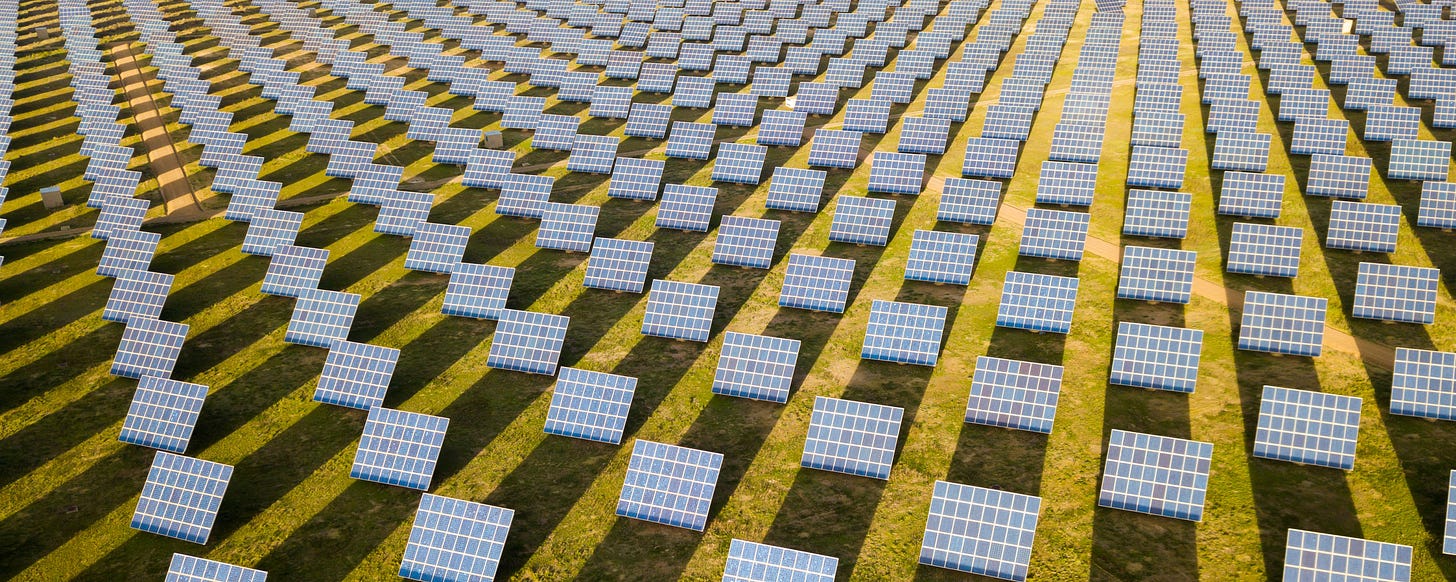Green energy saves the day!
Renewable energy is keeping the grid up during heatwaves, fossil fuel subsidies are rising, and an athlete who inspires
GOOD NEWS
As record-breaking heatwaves roasted Europe and North America this summer, sending energy demand soaring, renewable energy kept the lights and the air conditioning on.
California, the world’s fifth-largest economy, has largely managed to avoid blackouts as wind, solar, and batteries come to the rescue. Last year about 28 percent of the state’s energy came from renewable sources. Now that figure is almost 45 percent. Renewable energy has also helped power Texas through a brutally hot summer where some areas faced more than 30 straight days of triple digit temperatures and demand has broken all-time highs more than 10 times.
A major increase in solar energy generation since last summer has kept Europe cool, too. Solar provided almost a quarter of Spain’s electricity this July, up from 16 percent last year. When Sicily faced a peak in power demand in July, nearly half of the excess demand was covered by solar energy. In Belgium, solar covered more than 100 percent of the extra energy needed during daytime spikes in power demand.
Renewable energy’s success in Europe and the U.S. is tempered by results in Asia, where power grids have labored to keep up with surging demand despite heavy investment in renewable energy, leaving millions of people to suffer rolling blackouts in extreme heat. The region’s struggles offer a cautionary tale, reminding us that to be effective, renewable energy must be fully integrated into a nation’s power grid.
NOT-SO-GOOD NEWS
Governments around the world provided $7 trillion in subsidies to the fossil fuel industry last year. That’s up nearly $2 trillion thanks to “explicit” subsidies, or undercharging for supply costs, as governments attempted to protect consumers and businesses during the global spike in energy prices caused by Russia’s invasion of Ukraine and the economic recovery from the pandemic.
To put it in context, that’s $13 million per minute or nearly a thousand dollars per person per year; and it all goes to an industry that also recorded record profits the same year and responded to those profits by slashing their climate targets and cutting funding to their clean energy programs. All of this is happening, of course, as this summer we experienced the hottest two months on record in human history, something we scientists know would be nearly impossible without fossil fuel-driven warming. You can’t make this stuff up.
What if we got rid of these subsidies? The IMF estimates that would prevent 1.6 million premature deaths annually, raise government revenues by $4.4 trillion, and put the world on track to reaching global emissions targets. All of this would result from the cleaner air, less lung and heart disease, and fiscal freedom that would follow cutting and properly taxing carbon dioxide emissions.
So what’s holding us back from phasing out these payouts? It’s more politics than logistics. Economists have already figured out a Nobel-prize winning solution: taxing carbon pollution and putting the money back in taxpayer’s pockets. 39 countries have already done it, including Canada. The rest of us just need to get on board! If you’d like to help, connect with a Citizen’s Climate Lobby chapter near you.
INSPIRATION OF THE MONTH
Karishma Ali is a professional soccer player and a catalyst for change in her native Pakistan. She is an incredible advocate for women in sports, fearlessly leading the effort to overturn a ban on girls’ sports in rural Northern Pakistan, even in the face of death threats. Today, she’s extended her advocacy to climate action and solutions that directly impact the people and the place she calls home.
Growing up in the Hindu Kush mountain range exposed her to the impacts of climate change from a very young age, Karishma explains. “We live under glaciers. Not long ago, our village would be cool in the summer but nowadays, the summers are often oppressively hot. The mountains are warmer too and that’s the real problem because the snow and glaciers are melting and, since we’re in the valley, we’re in the path of terrible mudslides and are getting hit with awful flooding. When this happens, the roads can get washed away and then we’re completely cut off from the outside world! And the women are most impacted. The mudslides and floods mean that we have no access to local clean water, so they must walk for miles in each direction to find it.”
Karishma is fighting for gender equity and to safeguard the future of her community. She understands how climate change exacerbates these issues and is committed to making a difference. In a rapidly warming world, voices like hers are not only necessary but vital, showcasing the power of sports as a platform for equality and change. To learn more about Karishma’s inspiring journey, read this interview here.
Karishma is also an EcoAthletes Champion. To learn more about inspiring athletes advocating for climate action, check out their list here.
Weds., Sept. 13th at 12:30pm EDT - "Connecting with Americans on Climate Change" with MIT Environmental Solutions Initiative - online
Mon., Sept. 18th at 10am EDT - "Climate & Development Finance: What Works?" with Project Syndicate and European Investment Bank - in-person in NYC and online
Mon., Sept. 18th at 4:30pm EDT - "This is Climate: Women Leading the Charge" with the Washington Post at Climate Week NYC - live-stream
Thurs., Sept. 28th at 7pm EDT - "New England’s Climate Future: City, Land and Sea" with WGBH - in person in Boston, Massachusetts
Weds., Oct. 4th at 7:30pm EDT- "Fall for the Book: SAVING US" with George Mason University in Fairfax, VA - in person
Sun., Oct. 29th at 4pm CDT - "If the Sky Were Orange: Art in the Time of Climate Change" a panel discussion at the exhibit at the Blanton Museum of Art in Austin, TX - in person






Thank you, Katharine, especially for the many links to additional essential information. Excellent newsletter!
I have a stupid question. I am fairly susceptible to persuasion.
I recently watched the movie?documentary?farce? Planet of humans. I became so disturbed by the revelation?fact?falsehood? that the green earth movement is on the take. As in certain individuals/organizations are taking loads of money to the bank from their adversaries. Because we are all going to burn anyway so why not? We are burning up what trees we have left in huge “Biomass Burners”posing as “green alternatives”.
One of my childhood heroes is the implicated in this horrific crime. I am devastated.
I admit freely I am a bit of an old hippie and environmentalist from long ago but this just broke my heart afresh. I may be way wrong but would appreciate if someone could explain this to me????????